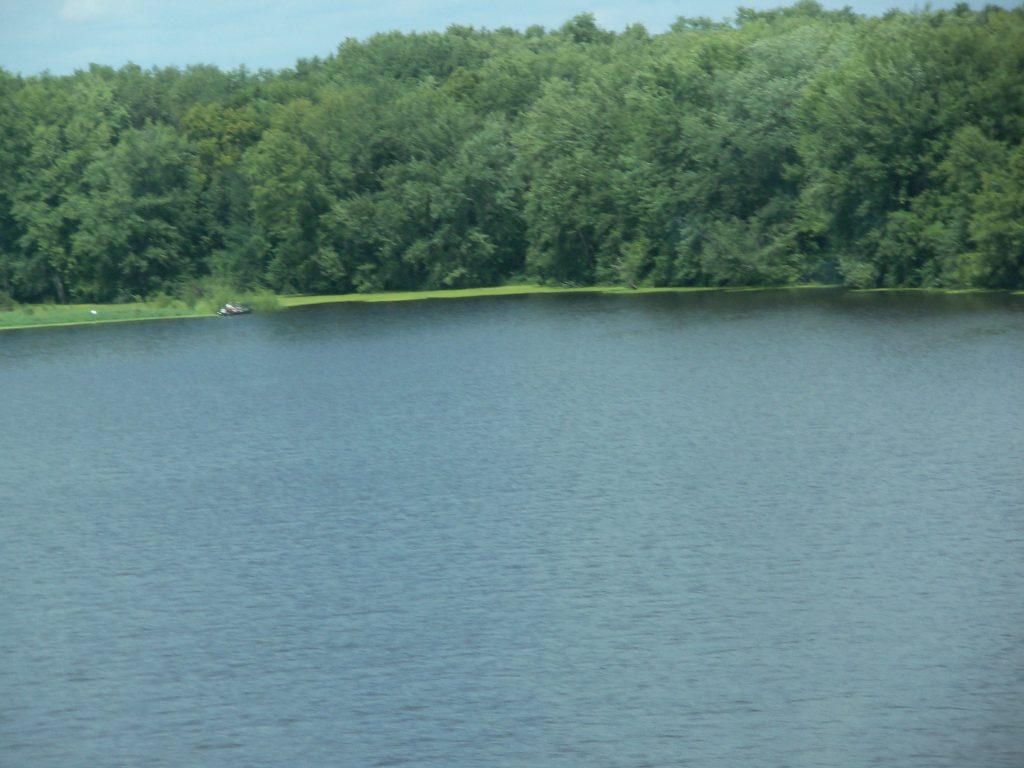Lake heading out of Wisconsin.
Thursday, 25 April 2024
Passing it with difficulty, we came to a place called Fair Havens, near the city of Lasea. Acts 27:8
Note: You can listen to today’s commentary courtesy of our friends at “Bible in Ten” podcast. (Click Here to listen).
You can also read this commentary, scrolling with music, courtesy of our friends at “Discern the Bible” on YouTube. (Click Here to listen), or at Rumble (Click Here to listen).
More exactingly, it reads, “And laboriously lying beside it, we came to a certain place being called Fair Havens, which was near Lasaea City” (CG).
Luke just detailed the slow and difficult sailing they had encountered on the Alexandrian ship since leaving Myra. He continues that now with the words, “And laboriously lying beside it.”
This is referring to sailing under the shelter of Crete off the shores of Salmone. The word translated as laboriously was just used in the previous verse. Luke repeats it here, providing extra emphasis concerning the immensely trying voyage they were on.
He also uses another new word seen only here and then again in verse 13 for “lying beside it,” paralegomai. It is another nautical term, coming from para, beside, and legó, a word that originally meant “lay down to sleep.” Later, it was used in the sense of “laying an argument to rest.” It is as if the ship were lying beside the coast, struggling to move on as the contrary winds and waves fought against them.
After this laborious time of trial, Luke says, “we came to a certain place being called Fair Havens, which was near Lasaea City.”
It was with great difficulty that they were able to pass the promontory. Eventually, they made it and came to Fair Havens. This is found on the southeast part of Crete. It was a place where the ship could be harbored temporarily.
The word translated as “havens” is the plural of the Greek word limén. It is found only here and twice in verse 12. It signifies a harbor, port, or haven.
Barnes notes, “It is called by Stephen, the geographer, ‘the fair shore.’ It still retains the name which it formerly had. It is called in ancient Dutch and French Sailing Directions ‘the beautiful bay.’”
The city of Lasaea appears to be otherwise unknown by this spelling, but Luke records it as a place that was well-known at his time.
Life application: Luke’s detailed record of the sailing continues to allow the modern reader to follow along with a map and see exactly where the voyage went from and to. One can almost imagine the laborious efforts of fighting wind and water as the sailors worked to get the ship forward.
An interesting part of what Luke has written is noting the city of Lasaea. As stated, Luke’s spelling of it seems to be otherwise unknown, however, Wikipedia notes –
“Lasaea or Lasaia (Ancient Greek: Λασαία) was a city on the south coast of ancient Crete, near the roadstead of the ‘Fair Havens’ where apostle Paul landed. This place is not mentioned by any other writer, under this name but is probably the same as the Lisia of the Peutinger Table, 16 M.P. to the east of Gortyna. Some manuscripts have Lasea; others, Alassa. The Vulgate reads Thalassa, which Theodore Beza contended was the true name. According to the Stadiasmus Maris Magni, which calls the place Halas (Άλας), it had a harbour and was located 50 stadia from Leben and 80 stadia from Matala.”
A Hellenistic gravestone was found at this location which is pictured in the Wikipedia article. For much of history, since Luke penned his words, even until more recent times, the city was more or less unknown to scholars. And yet, Luke’s record of it meant that it was there. By people getting out a spade and setting out in the area to search for it, evidence of it has been obtained.
If you are ever questioning the accuracy of what the Bible says because someone argues against it, be sure to do your own research. Don’t just take people’s arguments at face value. It is certain that there is a world full of people who are intent on destroying your faith.
Luke was a careful chronicler of the places and events he encountered. So give him a nod of trust as you continue your search for validation of something he has stated. Eventually, it will present itself. Someday, we will be able to thank him personally for his detailed writings that helped us know the story of how the church and the message of Jesus Christ spread out from the land of Israel to the inhabited world.
Lord God, what a treat it is to read Your word and to consider the people and places that we read about. The word comes alive as we think about their struggles, their trials, their victories, and the hope that they possessed because of Your promise to the people of the world. What a wonderful record of Your guiding hand upon the process of redemption of mankind! Thank You for Your precious word. Amen.

